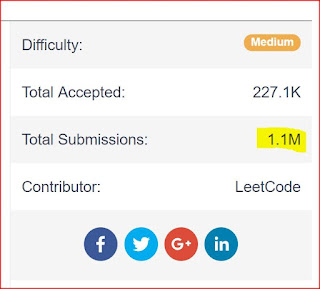LeetCode seems to be as popular as YouTube
I was shocked when I looked at this problem on LeetCode today: https://leetcode.com/problems/decode-ways/description/
We'll get back to the problem soon, but the shocking part wasn't so much that this is a medium-complexity dynamic programming problem, but rather it was this:
Unless the site is lying or there is a bug somewhere, there have been over 1,000,000 submissions to this problem!
You see numbers of this magnitude on popular Instagram posts or popular silly (or professional) YouTube videos.
But I'd never have imagined that an algorithm problem that if you try brute-force times out hence you want to use dynamic programming (memoization) to cut down the execution time to O(n)-time at the cost of an extra space of O(n) space complexity would ever be something popular!
Code is everything, it is everywhere, algorithms are the heart of this world and it is amazing to be leaving in such a revolutionary era where in the past 100 years everything has been transformed due to algorithms and mathematics!!!
Alright, the solution to the problem (copied/pasted below) is down below, DP. Cheers, Marcelo.
We'll get back to the problem soon, but the shocking part wasn't so much that this is a medium-complexity dynamic programming problem, but rather it was this:
Unless the site is lying or there is a bug somewhere, there have been over 1,000,000 submissions to this problem!
You see numbers of this magnitude on popular Instagram posts or popular silly (or professional) YouTube videos.
But I'd never have imagined that an algorithm problem that if you try brute-force times out hence you want to use dynamic programming (memoization) to cut down the execution time to O(n)-time at the cost of an extra space of O(n) space complexity would ever be something popular!
Code is everything, it is everywhere, algorithms are the heart of this world and it is amazing to be leaving in such a revolutionary era where in the past 100 years everything has been transformed due to algorithms and mathematics!!!
Alright, the solution to the problem (copied/pasted below) is down below, DP. Cheers, Marcelo.
A message containing letters from
A-Z is being encoded to numbers using the following mapping:'A' -> 1 'B' -> 2 ... 'Z' -> 26
Given a non-empty string containing only digits, determine the total number of ways to decode it.
Example 1:
Input: "12" Output: 2 Explanation: It could be decoded as "AB" (1 2) or "L" (12).
Example 2:
Input: "226" Output: 3 Explanation: It could be decoded as "BZ" (2 26), "VF" (22 6), or "BBF" (2 2 6).
public int NumDecodings(string s)
{
if (String.IsNullOrEmpty(s)) return 0;
int[] dp = new int[s.Length];
//Base
dp[0] = (s[0] >= '1' && s[0] <= '9') ? 1 : 0;
if (dp[0] == 0) return 0;
//Construction
for (int i = 1; i < s.Length; i++)
{
if (s[i] >= '1' && s[i] <= '9') dp[i] = dp[i - 1]; //Only one option
string p = s.Substring(i - 1, 2);
int n = Int32.Parse(p);
if (!p.StartsWith("0") && n >= 1 && n <= 26)
{
if (i - 2 < 0) dp[i]++; //One more
else dp[i] += dp[i - 2]; //Adding the option from two cells back
}
}
return dp[dp.Length - 1];
}





Great solution, Marcelo! It can be further optimized by not using a dp array, since only 2 states are used, removing `if`s from the loop as they cause pipeline stalls, and not using Substring/Parse which are also not free.
ReplyDeleteOnce implemented these ideas look like
class Solution {
public:
int numDecodings(const string& s) {
if (s.empty()) return 0;
if (s.size() == 1) return s[0] != '0';
int n_2 = s.back() != '0';
int n_1 = (s[s.size()-2] != '0') * n_2 + (s[s.size()-2] == '1' || s[s.size()-2] == '2' && s.back() <= '6');
for (int i = s.size()-3; i >= 0; --i) {
int num = (s[i] > '0') * n_1 + (s[i] == '1' || s[i] == '2' && s[i+1] <= '6') * n_2;
n_2 = n_1;
n_1 = num;
}
return n_1;
}
};
https://gist.github.com/ttsugriy/f7d2b2671a90d228e53e9b7358f32253
I've also posted my poor explanation on https://leetcode.com/problems/decode-ways/discuss/227291/O(N)-time-O(1)-space-DP-solution-in-C%2B%2B-(0ms)
P.S.: this is indeed great that programming challenges are getting so popular. I guess a lot of people are prepping for interviews :)
ReplyDelete